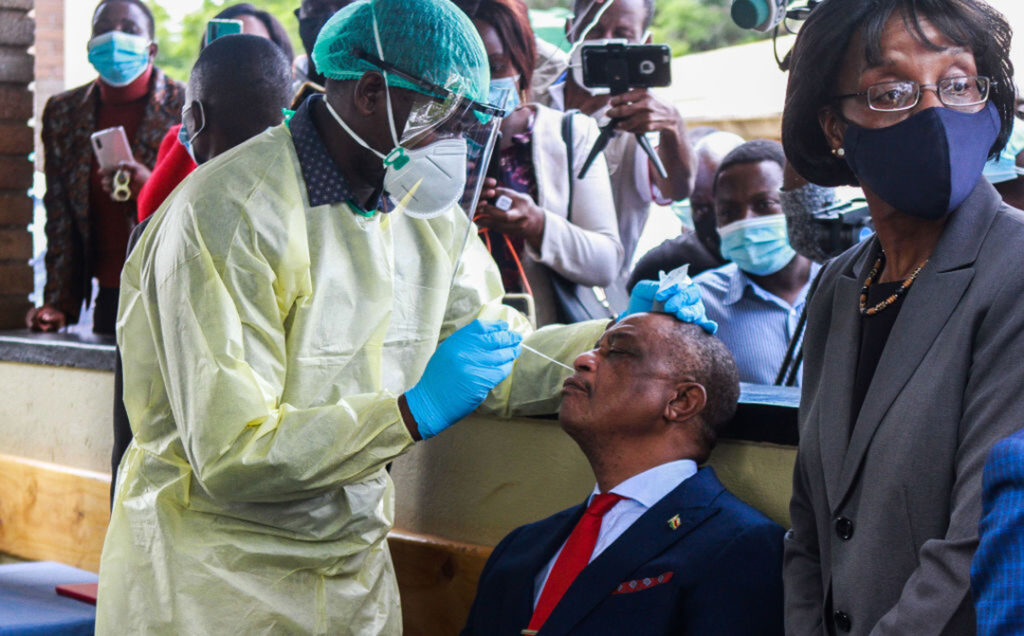ADF STAFF
Last year, the Independent Panel for Pandemic Preparedness and Response called for urgent action to end the COVID-19 pandemic and prevent future disease outbreaks.
In May, the panel, established by the World Health Organization (WHO) at the onset of the pandemic, released a 50-page report that questioned the will of global and local governments to achieve either goal.
“One year on, and political focus to prepare for more [COVID-19] waves is flagging,” Independent Panel co-Chairs Helen Clark, the former prime minister of New Zealand and Ellen Johnson Sirleaf, the former president of Liberia, wrote in the report. “Work has begun to prevent the next pandemic, but at the current pace, the transformative change required will take years to complete.”
Disruptions to normal life caused by the coronavirus continue to delay the recovery of African economies and health systems, Francisca Mutapi, a Zimbabwean professor in global health infection and immunity at the University of Edinburgh, wrote in The Conversation. Mutapi helped write the panel’s May report.
But there is still time to prepare for future pandemics, according to Mutapi.. Mutapi’s report in The Conversation highlighted five actions the panel recommended to prepare for future disease outbreaks.
Equal Access to Medical Supplies
The WHO’s Access to COVID-19 Tools Accelerator, a global collaboration, was meant to speed up development, production and equitable access to COVID-19 tests and treatments but has not met expectations.
The panel calls for a complete, independent assessment to improve the Tools Accelerator.
“African governments should call for global intellectual property waiver policies for COVID-19 tests [and] treatments … and use these to grow domestic pharmaceutical capabilities,” Mutabi wrote. “They should also push for a pre-negotiated platform to facilitate equitable and timely access to medical products on the global market during emergencies.”
Financing for Every Country
Money “set aside” for pandemic preparedness and response, primarily by G20 nations, was inadequate to handle COVID-19, Mutapi wrote. Distribution of funds was slow and what little money was available resulted in lower-income countries incurring more debt. In the future, international pandemic funding should be based on a country’s ability to pay, as well as how badly it is affected by disease.
Increase WHO Fees
Increasing member states’ fees could strengthen the WHO’s surveillance capacity, helping detect new threats faster. Because African epidemiology is unique, the continent’s health policies should be informed by local events and data, not global trends.
“So the WHO’s regional body needs more support to respond in ways that are relevant to the African context,” Mutapi wrote.
Establish a United Nations Council
The panel noted a lack of coordination between the United Nations, national governments and regional bodies. It called for a U.N. Council for Pandemic Preparedness on which African nations should be represented.
Enhancing the authority of both the WHO’s Africa region and the African Union to quickly report possible pandemic threats, investigate them and recommend interventions — without interference by individual countries — would improve responses to disease outbreaks, the panel concluded.
Strengthen Health Systems
Past pandemics helped prepare African nations to respond to COVID-19. The panel suggests that African nations also review their responses to the current pandemic to prepare for future ones.
Experiences with HIV and COVID-19 outbreaks revealed that African nations cannot rely on innovations from other countries to reach the continent in a timely manner, according to the panel. Many health systems in Africa were underfunded before COVID-19 hit and the pandemic made them weaker.
“So in addition to public health, Africa’s preparedness plans need to focus on health system strengthening and resilience,” Mutapi wrote.
The ability to produce medical supplies domestically is key to strengthening African health systems, according to the panel.
“New pandemic threats will emerge,” Clark and Sirleaf wrote. “The risks of not being better prepared for them are great, and inaction is hard to fathom.”

